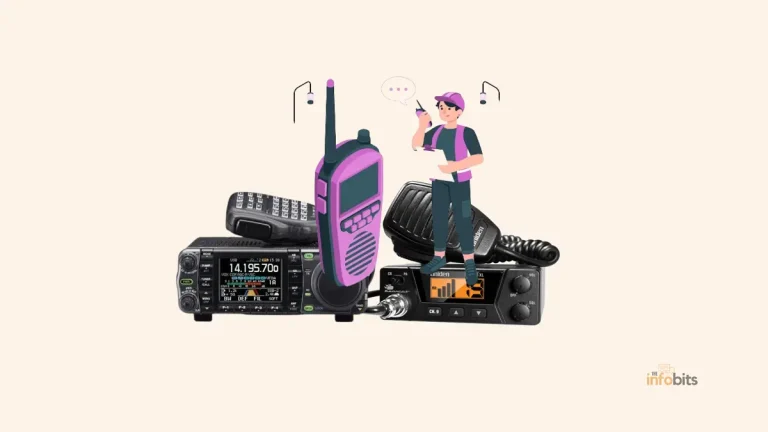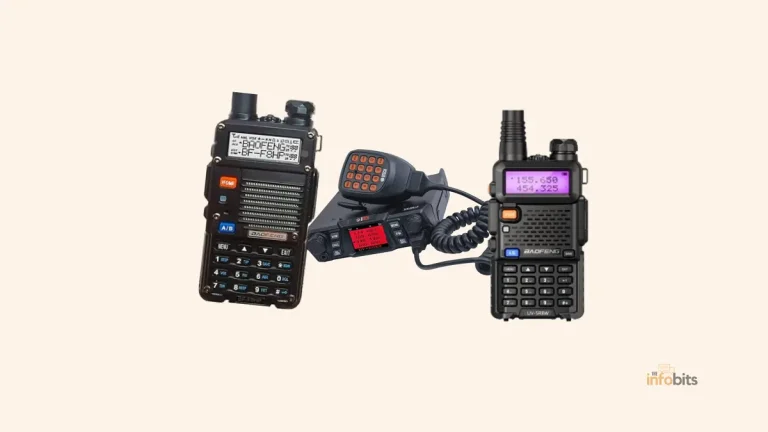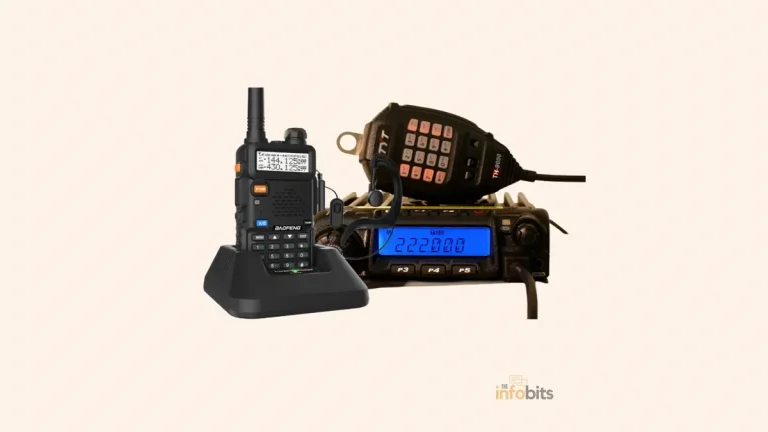How to Get a Ham Radio License? The Ultimate Guide
Ham radio, often known as amateur radio, is a fascinating activity that allows people to communicate with one another from all over the world.
To lawfully run a ham radio station, you must first get a ham radio license.
This article offers a thorough guide to obtaining a ham radio license. Whether you are a complete beginner or have prior experience with ham radio, here we will provide valuable insights into the importance of licensing, the steps involved in obtaining a license, exam preparation methods, and the numerous benefits and opportunities that come with becoming a licensed ham radio operator.
So, let’s have a look at ham radio licensing and see what fascinating communication possibilities await us.
Introduction to Ham Radio Licensing
What is Ham Radio?
Ham radio, commonly called amateur radio, is a hobby in which individuals interact via radio frequencies.
It’s similar to having your radio station; however, instead of simply listening, you can actively participate in conversations with other radio enthusiasts.
Related: Ham Radio vs CB Radio: Exploring the World of Communication
Why Get a Ham Radio License?
Now you may be asking why I need a license to run a radio.
Well, you know, the government takes these airwaves seriously, and rightly so.
A Ham radio license certifies that you understand the laws and regulations and can use your radio safely and responsibly.
Understanding the Basics of Ham Radio
History of Ham Radio
Ham radio has a lengthy and exciting history. It all began with those crazy innovators and experimenters who couldn’t stop playing with wireless communication.
From the early spark-gap transmitters to today’s modern digital modes, ham radio has grown into a fascinating activity that draws people from all walks of life together.
Types of Ham Radio Licenses
Ham radio licenses are classified into three levels: Technician, General, and Extra.
Each level provides you with varied advantages and access to numerous frequencies.
Imagine gaining new levels in a video game, but instead of battling dragons, you’ll be conversing with fellow hams all over the world.
The Importance of Getting a Ham Radio License
Legal Requirements
Now we know what you’re thinking. “Do I need a piece of paper to have fun with my radio?” Okay, technically, sure.
Operating a ham radio without a license is equivalent to driving without a license; it is against the law. Furthermore, being caught might result in huge fines and a lot of explaining to do.
Access to Ham Radio Frequencies
A ham radio license grants you access to a range of frequencies designated only for licensed operators.
These frequencies give higher signal quality and less interference, allowing you to communicate locally and internationally with other hams.
If you wish to fully participate in the ham radio community, obtaining a license is the best option.
Steps to Obtain a Ham Radio License
Researching License Requirements
Before you enter the world of ham radio, do some research on the licensing requirements in the country you live in.
Different countries have different requirements, so be sure you understand what you need to do to become licensed.
Choosing the Right License Level
Once you’ve understood the criteria, you may select the licensing level that best matches your interests and aspirations.
If you’re new, starting with the Technician license is an excellent way to get your feet wet.
However, if you want to access all of the benefits and go deep into the realm of amateur radio, pursuing the Extra license is worth the effort.
Finding Exam Sessions
Now that you’ve decided which license to seek, it’s time to discover an exam session near you. These are often arranged by local amateur radio groups or organizations.
Remember, tests might be difficult, but they are also an opportunity to demonstrate your expertise and join the ranks of certified hams.
Preparing for the Ham Radio License Exam
Studying Resources and Materials
Obtaining your ham radio license is like opening a whole new universe of communication possibilities.
However, before you can begin using the airwaves, you must first prepare for the licensing exam. Fortunately, there are several tools and materials accessible to assist you in studying.
There are plenty of study materials available like the ARRL Ham Radio License Manual (view on Amazon), including online study guides and textbooks, particularly geared toward aspiring students.
Look for materials that address the exam’s themes and ideas, such as radio wave propagation, operating procedures, and FCC rules. Find a study guide that fits your learning style and dive in!
Practice Exams and Mock Tests
While studying is necessary, it’s also critical to test your knowledge and become acquainted with the exam style.
Practice assessments and mock tests are great tools for determining your preparation and pinpointing areas that require extra attention.
Practice tests are available online and in study guides, with many designed to simulate the real exam experience.
Make use of these tools and push yourself with timed practice exams. Not only will they boost your confidence, but they will also offer you an idea of the exam’s difficulty level.
Taking the Ham Radio License Exam
Exam Format and Structure
Exam day has arrived. Understanding the method as well as the structure of the ham radio license exam will help ease last-minute nerves and ensure a more pleasant experience.
The test normally includes multiple-choice questions about various topics in amateur radio. The number of questions and passing score criteria vary according to the license level you want.
Make sure you understand the precise criteria for the license you’re pursuing.
Tips for Success
When it comes to passing the exam, preparation is essential. Here are a few strategies to assist you increase your chances of success.
- Thoroughly review all of the study materials, with an emphasis on areas where you lack confidence.
- Use online forums and study groups to interact with experienced professionals who can provide advice and direction.
- Try not to prepare just before the exam. Allow yourself some time to relax and recharge your mind.
- Do not be hesitant to ask clarifying questions before or during the exam.
- Remain calm and confident. Remember, even if you don’t pass the first time, you can always try again.
Post-License Activities and Resources
Getting on the Air
Congratulations! You passed the ham radio license exam, and now it’s time to put what you have learned to use.
Getting on the air is an exciting step that allows you to speak with other hams from all over the world. Investing in a radio and antenna setup designed for beginners can help you get started.
Choose a frequency range appropriate for your license class and contact other ham operators.
To identify what works best for you, try other ways of communication, such as speech, Morse code, and digital techniques.
Joining Amateur Radio Clubs and Communities
Do not be alone in the world of amateur radio! Joining amateur radio organizations and communities is a great opportunity to meet experienced hams, benefit from their knowledge, and share your own experiences.
Amateur radio clubs frequently provide events, conferences, and training sessions that might help you improve your abilities.
You will also be able to engage in on-air contests and community service projects. The friendship and encouragement of other hams will make your experience in the hobby much more pleasurable.
Benefits and Opportunities of Obtaining a Ham Radio License
Enhancing Communication Skills
Obtaining a Ham radio license entails not just learning about radios and frequencies but also improving your communication abilities.
Conversations with other Hams from different walks of life can help you become a better listener, develop clearer speaking, and enhance your general communication skills.
Exploring Emergency Communication Roles
Amateur radio operators play an important role in emergency communications.
During a crisis, when established communication systems are disrupted, hams step in to offer critical communication links.
Obtaining a ham radio license allows you to aid your community during crises and keep people connected when it is most important.
Participating in Amateur Radio Events and Contests
Amateur radio is more than just communication; it’s also about having fun! Throughout the year, there are several amateur radio events and contests where you may put your talents to the test, network with other hams, and possibly win some prizes.
From Field Day to the ARRL Contests, there are plenty of opportunities to embrace the competitive side of amateur radio while experiencing the excitement of friendly competition.
So, what are you waiting for? Dive into the world of amateur radio, study hard, get licensed, and join a thriving community of radio enthusiasts who are waiting to welcome you with open arms.
Related: What Is the Importance of Ham Radio?
Conclusion
To summarize, having a Ham radio license gives up a world of opportunities for communication lovers.
From the excitement of making contacts in far-flung locales to the sense of community found in amateur radio groups, ham radio provides a unique and fulfilling experience.
By following the instructions given in this article and allocating time for study and preparation, you may begin on a journey that combines technical knowledge, communication skills, and lifelong learning.
So, take the sink, obtain your ham radio license, and join the thriving community of amateur radio operators throughout the world. Happy communication!
Frequently Asked Questions
1. Do I need a license to operate a ham radio?
Yes, a ham radio license is necessary to lawfully operate a ham radio station. The licensing procedure guarantees that operators understand the laws and regulations regulating amateur radio communications and have the expertise required to operate their equipment safely and responsibly.
2. How difficult is the ham radio license exam?
The complexity of the ham radio license test varies according to the license level you are pursuing. The entry-level Technician license test is easy, covering fundamental radio theory, regulations, and operating procedures. The General and Extra licensing tests need a better comprehension of technical ideas and may be more difficult. Individuals from diverse backgrounds, with diligent study and preparation, can effectively pass the tests.
3. Are there age restrictions for obtaining a ham radio license?
No, there are no age requirements for getting a ham radio license. People of all ages, including children, can seek and get a ham radio license. Individuals under the age of 13 must be accompanied by an adult guardian or mentor during the examination and licensure procedure.
4. Can I operate a ham radio outside of my home country?
Yes, ham radio operators with a valid license in their own country can frequently use their equipment in other countries under reciprocal licensing arrangements. However, to comply with the norms of the nation in which you intend to operate, you must first become acquainted with its special legislation and licensing requirements.
Please share this article with your friends and relatives if you find it useful.
We also ask that you bookmark this page for future reference, as we are constantly updating our articles with new information.
Sign up for our free newsletter as well to receive fresh information immediately in your inbox and keep technically up to date.





